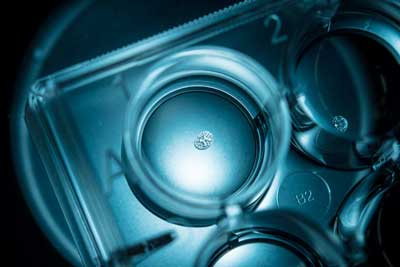| Jun 19, 2020 | |
NIH grant to bioprint nanoparticles for ovarian cancer immunotherapy(Nanowerk News) Nanoengineers at UC San Diego received a five-year, $2.9 million grant from the National Institutes of Health to develop an immunotherapy for ovarian cancer using plant virus nanoparticles. The particles will be produced using 3D-bioprinting, enabling them to be released at specified intervals, instead of a continuous slow release. |
|
| High grade serous ovarian cancer (HGSOC) is the most common and severe form of ovarian cancer, accounting for an estimated 70 percent of all ovarian cancer diagnoses. To provide an effective and long lasting treatment for HGSOC, Professor Nicole Steinmetz plans to use a patient’s own irradiated tumor cells, coupled with a virus-like particle (VLP) from a plant virus that has been shown to boost the body’s immune response, to trigger the body to attack the tumor cells. | |
| The irradiated tumor cells will serve as the foreign agent telling the body’s immune response exactly what cells to attack. The co-released VLP will boost the natural immune response in reaction to these tumor cells. This is meant to create a cellular memory against these tumor antigens, creating a long-lasting and adaptive anti-tumor immunity and preventing relapse. | |
| “We have already demonstrated that our VLP nanotechnology is highly effective as a cancer immunotherapy,” said Steinmetz. “The innovation here lies in the advanced manufacturing coupled with the novel nanotechnology to produce a personalized immunotherapy to protect women with ovarian cancer from recurrence of this disease.” | |
 |
|
| These 3D printed implants were used to heal severe spinal cord injury in rat models. They were developed in Professor Shaochen Chen's 3D Bioprinting lab using the same method they'll use for this cancer immunotherapy implant. | |
| Steinmetz’ team developed the VLP nanotechnology from the same non-infectious, non-toxic plant virus they used to successfully treat melanoma in dogs, and has shown that these plant virus-like particles generate anti-tumor immunity in mice with ovarian cancer. | |
| The biopolymer immunotherapy will be delivered via an implant, produced using a 3D bioprinting technique developed in Professor Shaochen Chen’s 3D Bioprinting lab at the Jacobs School of Engineering. Known as rapid, microscale, continuous optical bioprinting, Chen’s team has used this 3D bioprinting method to create a spinal cord implant that could be used to promote nerve growth and treat spinal cord injury, as well as life-like liver tissue and intricate blood vessel networks. His lab will collaborate with Steinmetz to bioprint these immunotherapy implants incorporating the nanoparticles and irradiated tumor cells. | |
| “Our 3D bioprinting platform enables manufacturing of patient specific implants with precise control over both the topographical complexity and the cellular and material composition,” said Chen. “The engineering design space and tunability of this approach is impeccable; in particular the implant will be designed so that therapeutic doses are released in programmed intervals.” | |
| Ultimately, the researchers envision this immunotherapy implant being seamlessly added in to the existing ovarian cancer treatment process. During surgery to remove the bulk of the tumor, the biocompatible, biodegradable implant would be inserted in the cavity lining the patient’s abdomen, where it would release the engineered immunotherapy particles at timed intervals. | |
| This work is carried out at UC San Diego’s Center for Nano-ImmunoEngineering (Steinmetz is the founding director and Chen is also a member) and at Dartmouth College, where the UC San Diego team collaborates with Steve Fiering, a professor of Microbiology and Immunology and of Genetics at the Geisel School of Medicine at Dartmouth. Fiering is also a member of the Immunology and Cancer Immunotherapy Research Program at Dartmouth's Norris Cotton Cancer Center. | |
| Fiering and Steinmetz have been working as a team toward the translation of the VLP cancer immunotherapy since 2015; this new grant will pave the way for applications in ovarian cancer. Dr. Stephen Howell, Professor of Medicine at UC San Diego, is contributing to the project by providing a clinical perspective. |
| Source: UC San Diego | |
|
Subscribe to a free copy of one of our daily Nanowerk Newsletter Email Digests with a compilation of all of the day's news. |
